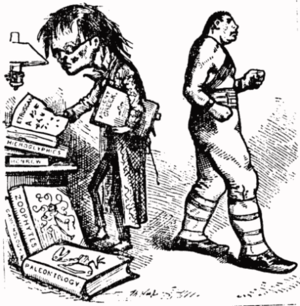Anti-intellectualism
This article has many issues. Please help fix them or discuss these issues on the article's talk page.
|
Anti-intellectualism is hostility to and the distrust of intellect, intellectuals, and intellectualism. People who follow anti-intellectualism usually say that education and philosophy are overrated. They also say that art, literature, history, and science are impractical, politically motivated, and even contemptible human pursuits.[1] Anti-intellectuals usually style themselves to be those who understand the common people. They see themselves as part of these common people too. They are like populists who fight against a political and academic elite. For them, educated people are a class that dominates political discourse and more advanced education while not understanding the concerns of ordinary people.

In the past, totalitarian governments have manipulated and applied anti-intellectualism to repress political dissent.[2] [better source needed] During the Spanish Civil War (1936–1939) and the following dictatorship (1939–1975) of General Francisco Franco, the reactionary repression of the White Terror (1936–1945) was notably anti-intellectual, with most of the 200,000 civilians killed, being mostly the Spanish intelligents, the politically active teachers and academics, artists and writers of the deposed Second Spanish Republic (1931–1939). During the Cambodian Genocide (1975–1979), the totalitarian regime of Cambodia led by Pol Pot nearly destroyed its entire educated population.